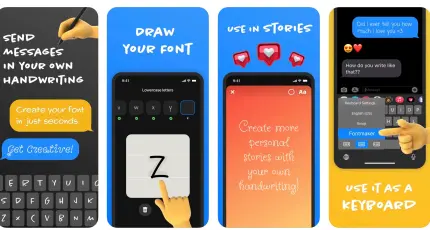Does this sound familiar? An app goes viral on social media, often including TikTok, then immediately climbs to the top of the App Store where it gains even more new installs thanks to the heightened exposure. That’s what happened with the recent No. 1 on the U.S. App Store,
Fontmaker
, a subscription-based fonts app which appeared to benefit from word-of-mouth growth thanks to TikTok videos and other social posts. But what we’re actually seeing here is a new form of App Store marketing — and one which now involves one of the oldest players in the space: Vungle
.
Fontmaker, at first glance, seems to be just another indie app that hit it big.
The app, published by an entity called Mango Labs, promises users a way to create fonts using their own handwriting which they can then access from a custom keyboard for a fairly steep price of $4.99 per week. The app first launched on July 26. Nearly a month later, it was the No. 2 app on the U.S. App Store, according to Sensor Tower data. By August 26, it climbed up one more position to reach No. 1. before slowly dropping down in the top overall free app rankings in the days that followed.
By Aug. 27, it was No. 15, before briefly surging again to No. 4 the following day, then declining once more. Today, the app is No. 54 overall and No. 4 in the competitive Photo Video category — still, a solid position for a brand-new and somewhat niche product targeting mainly younger users. To date, it’s generated $68,000 in revenue, Sensor Tower reports.
But Fontmaker may not be a true organic success story, despite its Top Charts success driven by a boost in downloads coming from real users, not bots. Instead, it’s an example of how mobile marketers have figured out how to tap into the influencer community to drive app installs. It’s also an example of how it’s hard to differentiate between apps driven by influencer marketing and those that hit the top of the App Store because of true demand — like walkie-talkie app Zello, whose recent trip to No. 1 can be attributed to Hurricane Ida.
As it turns out, Fontmaker is not your typical “indie app.” In fact, it’s unclear who’s really behind it. Its publisher, Mango Labs, LLC, is actually an iTunes developer account owned by the mobile growth company
JetFuel
, which was recently acquired
by the mobile ad and monetization firm Vungle — a longtime
and sometimes controversial
player in this space, itself acquired
by Blackstone in 2019.
Vungle was
primarily interested in
JetFuel’s main product, an app called The Plug
, aimed at influencers.
Through The Plug, mobile app developers and advertisers can connect to JetFuel’s network of over 15,000 verified influencers who have a combined 4 billion Instagram followers, 1.5 billion TikTok followers, and 100 million daily Snapchat views.
While marketers could use the built-in advertising tools on each of these networks to try to reach their target audience, JetFuel’s technology allows marketers to quickly scale their campaigns to reach high-value users in the Gen Z demographic, the company claims. This system can be less labor-intensive than traditional influencer marketing, in some cases. Advertisers pay on a cost-per-action (CPA) basis for app installs. Meanwhile, all influencers have to do is scroll through The Plug to find an app to promote, then post it to their social accounts to start making money.
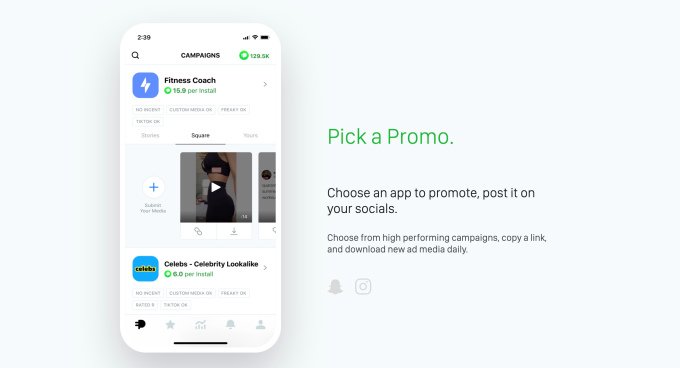
Image Credits: The Plug’s website, showing influencers how the platform works
So while yes, a lot of influencers may have made TikTok videos about Fontmaker, which prompted consumers to download the app, the influencers were paid to do so. (And often, from what we saw browsing the Fontmaker hashtag, without disclosing that financial relationship in any way — an increasingly
common
problem
on TikTok, and area of concern for the FTC.)
Where things get tricky is in trying to sort out Mango Labs’ relationship with JetFuel/Vungle. As a consumer browsing the App Store, it looks like Mango Labs makes a lot of fun consumer apps of which Fontmaker is simply the latest.
JetFuel’s website helps to promote this image, too.
It had showcased its influencer marketing system using a case study from an “indie developer” called Mango Labs and one of its earlier apps, Caption Pro. Caption Pro launched in Jan. 2018. (App Annie data indicates it was removed from the App Store on Aug. 31, 2021…yes, yesterday).

Image Credits: App Annie
Vungle, however, told TechCrunch “The Caption Pro app no longer exists and has not been live on the App Store or Google Play for a long time.” (We can’t find an App Annie record of the app on Google Play).
They also told us that “Caption Pro was developed by Mango Labs before the entity became JetFuel,” and that the case study was used to highlight JetFuel’s advertising capabilities. (But without clearly disclosing their connection.)
“Prior to JetFuel becoming the influencer marketing platform that it is today, the company developed apps for the App Store. After the company pivoted to become a marketing platform, in February 2018, it stopped creating apps but continued to use the Mango Labs account on occasion to publish apps that it had third-party monetization partnerships with,” the Vungle spokesperson explained.
In other words, the claim being made here is that while Mango Labs, originally, were the same folks who have long since pivoted to become JetFuel, and the makers of Caption Pro, all the newer apps published under “Mango Labs, LLC” were not created by JetFuel’s team itself.
“Any apps that appear under the Mango Labs LLC name on the App Store or Google Play were in fact developed by other companies, and Mango Labs has only acted as a publisher,” the spokesperson said.
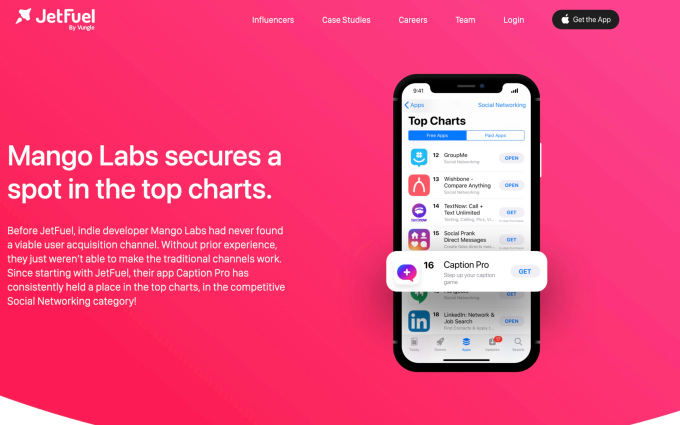
Image Credits: JetFuel’s website describing Mango Labs as an “indie developer”
There are reasons why this statement doesn’t quite sit right — and not only because JetFuel’s partners seem happy to hide themselves behind Mango Labs’ name, nor because Mango Labs was a project from the JetFuel team in the past. It’s also odd that Mango Labs and another entity,
Takeoff Labs
, claim the same set of apps. And like Mango Labs, Takeoff Labs is associated with JetFuel too.
Breaking this down, as of the time of writing, Mango Labs has published several consumer apps on both the App Store and Google Play.
On iOS, this includes the recent No. 1 app Fontmaker, as well as FontKey, Color Meme, Litstick, Vibe, Celebs, FITme Fitness, CopyPaste, and Part 2. On Google Play, it has two more: Stickered and Mango.
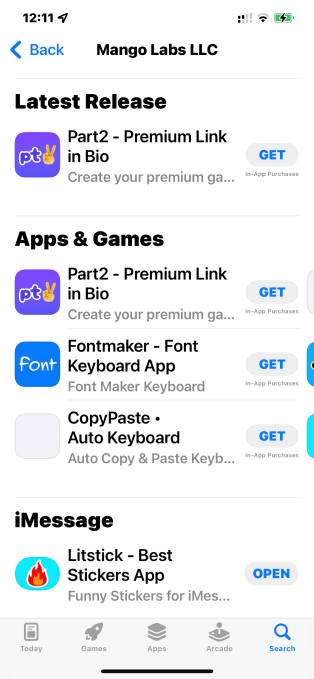
Image Credits: Mango Labs
Most of Mango Labs’ App Store listings point to JetFuel’s website as the app’s “developer website,” which would be in line with what Vungle says about JetFuel acting as the apps’ publisher.
What’s odd, however, is that the Mango Labs’ app Part2, links to Takeoff Labs’ website from its App Store listing.
The Vungle spokesperson initially told us that Takeoff Labs is “an independent app developer.”
And yet, the Takeoff Labs’ website shows a team which consists of JetFuel’s
leadership
, including JetFuel co-founder and CEO Tim Lenardo
and JetFuel co-founder and CRO JJ Maxwell
. Takeoff Labs’ LLC application
was also signed by Lenardo.
Meanwhile, Takeoff Labs’ co-founder and CEO
Rhai Goburdhun
, per his LinkedIn and the Takeoff Labs website, still works there. Asked about this connection, Vungle told us they did not realize the website had not been updated, and neither JetFuel nor Vungle have an ownership stake in Takeoff Labs with this acquisition.
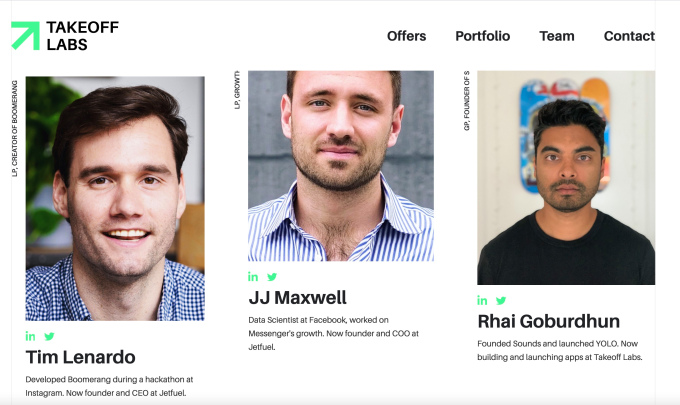
Image Credits: Takeoff Labs’ website showing its team, including JetFuel’s co-founders.
Takeoff Labs’ website
also shows off its “portfolio” of apps, which includes Celeb, Litstick, and FontKey — three apps that are published by Mango Labs on the App Store.
On Google Play, Takeoff Labs is the developer credited with Celebs, as well as two other apps, Vibe and Teal, a neobank. But on the App Store, Vibe is published by Mango Labs.
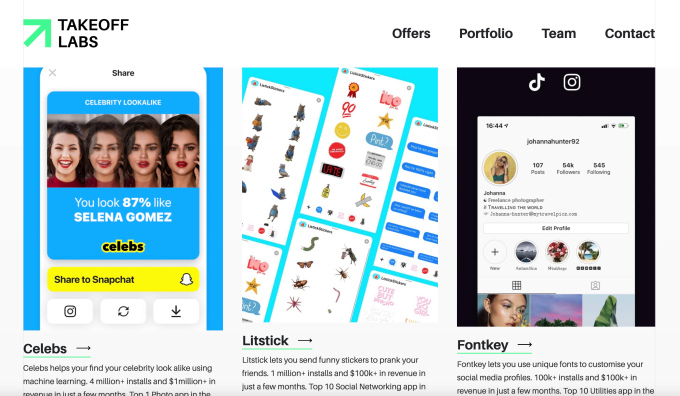
Image Credits: Takeoff Labs’ website, showing its app portfolio.
(Not to complicate things further, but there’s also an entity called
RealLabs
which hosts JetFuel, The Plug and other consumer apps, including Mango — the app published by Mango Labs on Google Play. Someone sure likes naming things “Labs!”)
Vungle claims the confusion here has to do with how it now uses the Mango Labs iTunes account to publish apps for its partners, which is a “common practice” on the App Store. It says it intends to transfer the apps published under Mango Labs to the developers’ accounts, because it agrees this is confusing.
Vungle also claims that JetFuel “does not make nor own any consumer apps that are currently live on the app stores. Any of the apps made by the entity when it was known as Mango Labs have long since been taken down from the app stores.”
JetFuel’s system is messy and confusing, but so far successful in its goals. Fontmaker did make it to No. 1, essentially growth hacked to the top by influencer marketing.
Congrats to
@Rhai_Gb
the @Takeoff_Labs
team- it's great to be back at #1 overall 🙌
Also a huge accomplishment for
@jetfuel_it
as the only user acquisition source. The first time we've single-handedly moved an app to #1 Top Free! https://t.co/Cl8ahj8Owo
Tim L (@telenardo)
August 25, 2021
But as a consumer, what this all means is that you’ll never know who actually built the app you’re downloading or whether you were “influenced” to try it through what were, essentially, undisclosed ads.
Fontmaker isn’t the first to growth hack its way to the top through influencer promotions. Summertime hit
Poparrazzi also hyped itself to the top of the App Store
in a similar way, as have many others. But Poparazzi has since sunk to No. 89 in Photo Video, which shows influence can only take you so far.
As for Fontmaker, paid influence got it to No. 1, but its Top Chart moment was brief.
 简体中文
简体中文

